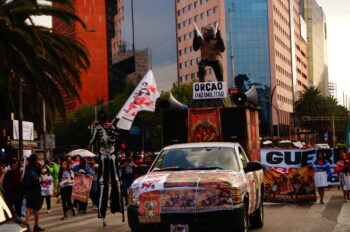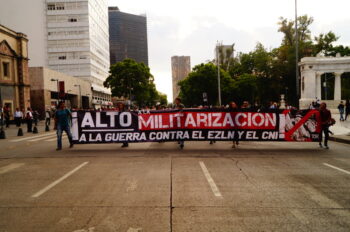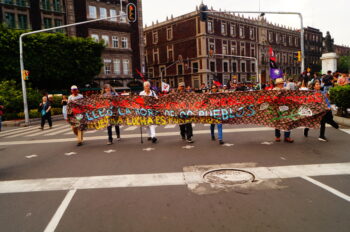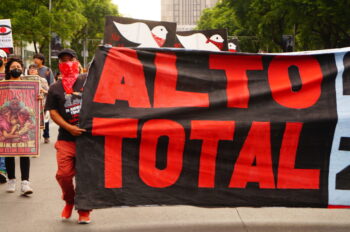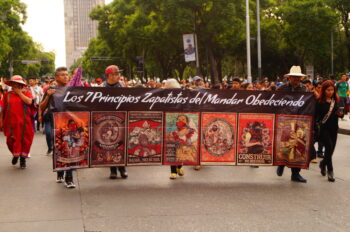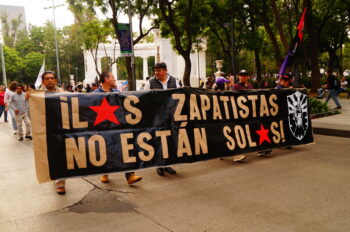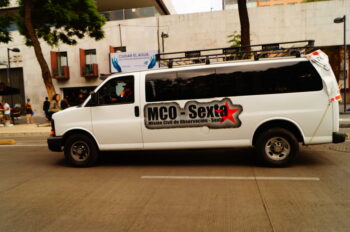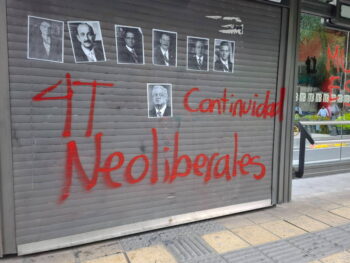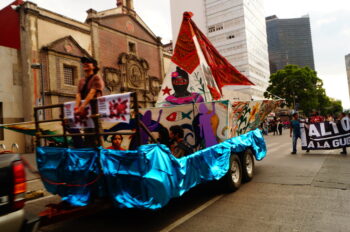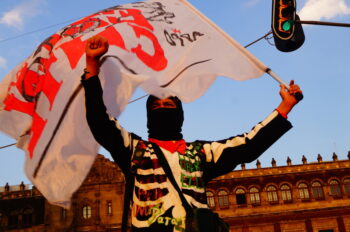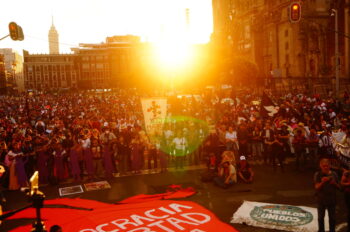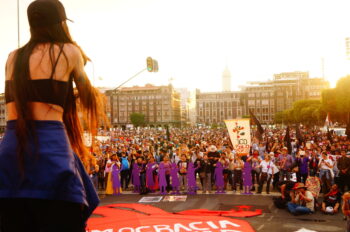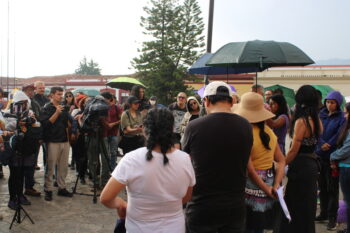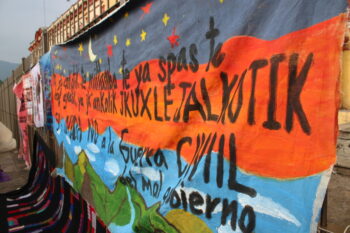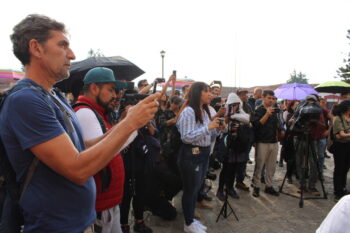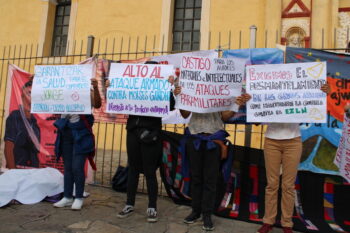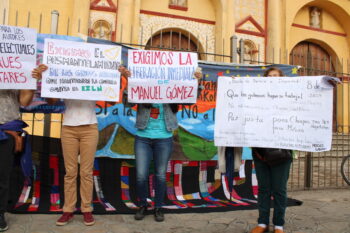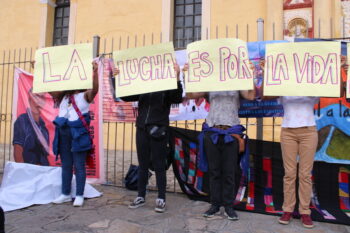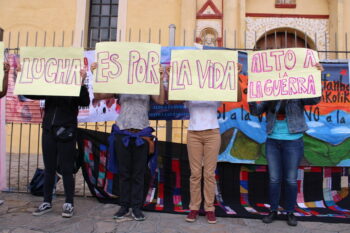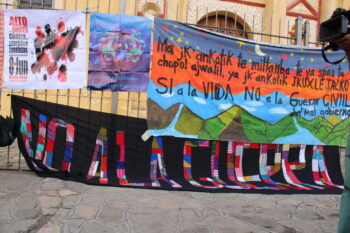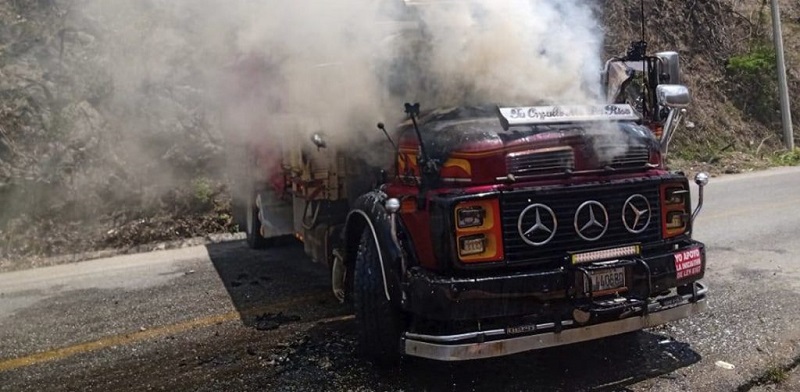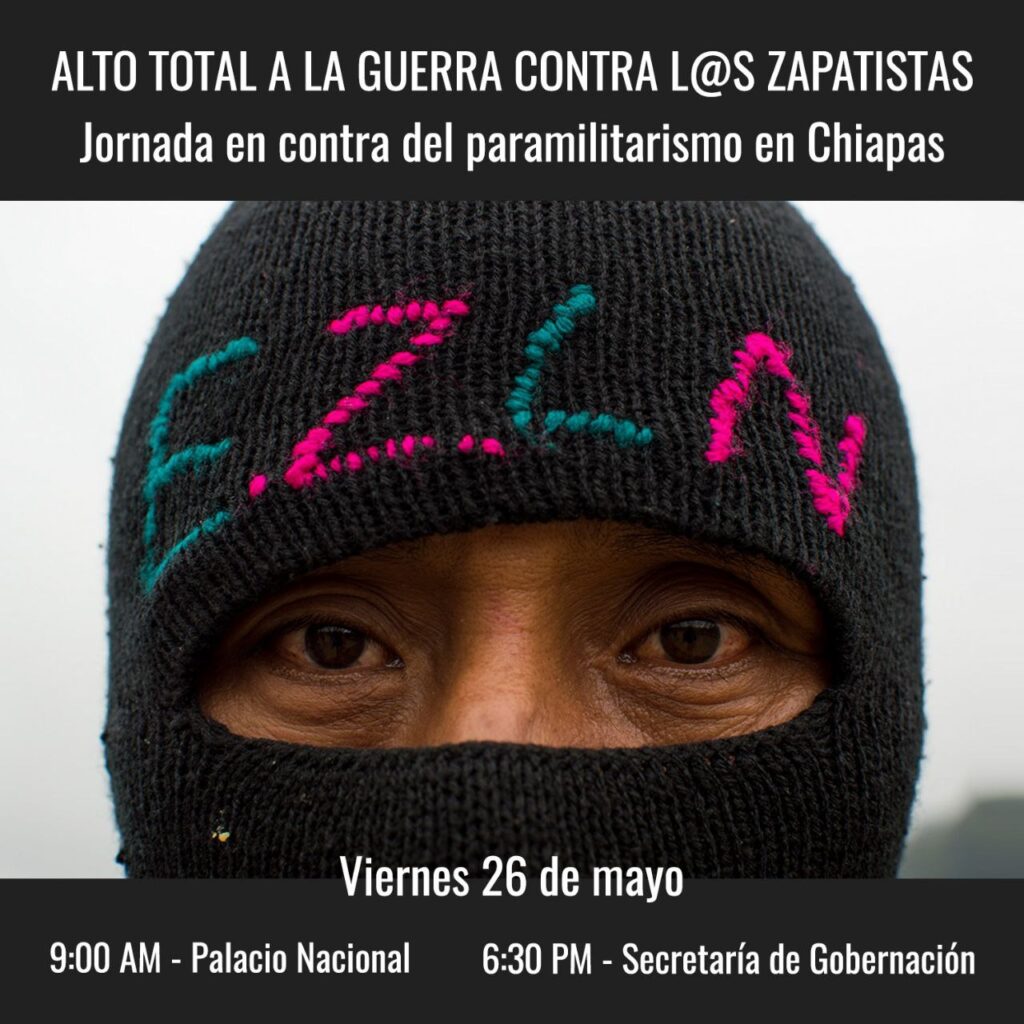(Español) Chiapas: La violencia que arriba pretenden ocultar
Apenas el pasado 8 de junio, organizaciones de México y del mundo nos movilizamos en 72 geografías distintas del planeta, para denunciar los ataques del grupo paramilitar ORCAO del 22 de mayo contra comunidades bases de apoyo zapatistas. En este ataque, que se prolongó durante cinco días, resultó herido de bala el compañero Jorge López Sántiz, quien presenta graves secuelas debido a que su intestino quedó muy afectado.
Las movilizaciones fueron la respuesta organizada de miles de personas que vemos con alarma cómo crece la violencia contra las comunidades zapatistas y contra los pueblos de Chiapas y de México. Nuestro llamado de alto a la guerra llegó a muchos oídos y corazones, pero no al Estado mexicano y su clase política.
Del 19 al 22 de junio, este grupo paramilitar continuó con el asedio a las bases de apoyo zapatistas. Con la anuencia o inacción de los tres niveles de gobierno, se ha buscado escalar la guerra atacando con armas de fuego de manera continua y coordinada en tres poblados zapatistas: Emiliano Zapata, San Isidro y Moisés y Gandhi, ubicados en el municipio de Ocosingo, Chiapas.
El saldo, más de 800 detonaciones de armas de fuego de alto y bajo calibre dirigidas a las casas, escuelas y clínicas autónomas, además de la quema de las parcelas en las que trabajan las familias bases de apoyo zapatistas.
Si bien estas agresiones forman parte de una estrategia de guerra paramilitar contra el movimiento zapatista que data de 1994, ahora se enmarcan en un contexto de creciente violencia, fomentado por la crisis económica en la que los pueblos no zapatistas viven; sin más recursos, dependientes y subordinados a las prebendas de programas sociales como Sembrando Vida. Pueblos no zapatistas se ven en la necesidad de intercambiar dinero por hectáreas de tierra, lo que ha llevado a organizaciones paramilitares como la ORCAO a realizar más de 100 ataques de 2019 a la fecha con el fin de despojar territorios.
En su conferencia matutina del 23 de junio, el titular del ejecutivo federal, acompañado de la secretaria de gobernación, del secretario de la defensa nacional y del gobernador de Chiapas, minimizó los ataques contra las comunidades zapatistas y la grave y ampliamente documentada situación que se vive en el estado de Chiapas. Además, lanzó descalificaciones contra organizaciones y personas defensoras del territorio, de los derechos humanos, y organizaciones que documentan y denuncian la violencia.
Esta actitud no sólo nos parece alarmante, nos preocupa que pueda tratarse del preámbulo de un ataque físico y/o mediático todavía mayor. Minimizar la violencia incentiva a los grupos paramilitares al cobijarlos con el manto de impunidad. En nuestra memoria quedaron bien grabadas las palabras que se dirigieron contra el compañero Samir Flores Soberanes previo a su asesinato, crimen que al día de hoy permanece impune.
Frente a esta situación, las organizaciones que firmamos llamamos a:
Denunciar las violencias contra las comunidades zapatistas, contra los pueblos de Chiapas y de México, y hacer frente al negacionismo con que se brinda impunidad a los grupos paramilitares.
Convocar a las personas de buen corazón de todas las geografías a presentar reclamos por escrito ante las representaciones diplomáticas mexicanas.
Acompañar, en la medida de las posibilidades de cada colectivo y persona, las acciones que se irán anunciando en los próximos días, así como organizar las propias.
Responsabilizamos a los titulares del ejecutivo federal y estatal, por las agresiones que puedan sufrir las comunidades zapatistas, las organizaciones defensoras de los Derechos Humanos, periodistas y organizaciones solidarias acompañantes.
Atentamente
Espacio de Coordinación Nacional
Alto a la guerra contra los pueblos zapatistas.
Si tocan a un@, nos tocan a tod@s.
Firmas:
Colectivos y organizaciones:
Congreso Nacional Indígena
Llegó la hora de los pueblos
Adherentes a la Sexta de Ciudad Juárez
Asociación de Explotación Científica Cultural y Recreativa “Brújula Roja”
Brigada Callejera, Cdmx
Brigada Comunal Tona -Guardianes del bosque Tlacotenco (autodefensa comunal)
Brigada «Dr. Ignacio Martín-Baró», Guadalajara, Jalisco
Centro de Investigación en Comunicación Comunitaria A.C.
Colectivo Amapipiltotun
Colectiva Autónoma de Colaboración Social / Toluca, Estado de México
CNI Milpa Alta, CDMX
Colectivo José Revueltas, Ciudad Juárez
Colectiva Jirafa, Cuernavaca Moreloa
Colectivx La Oveja Roja, Michoacán
Colectivo Mujeres Tierra, de Mexicali
Colectivo Resistrenzas, Puebla
Colectivo Tejiendo Luchas, Xalapa-CDMX
Colectivo de Telefonistas Zapatistas
Colectivo Tlapapipiltotun
Confederación de Jubilados, Pensionados y Adultos Mayores de la República Mexicana A.C.
Comunidad de Tlanezi Calli en Resistencia.
Comunidad de Xochitlanezi
Coordinación Metropolitana, Anticapitalista y Antipatriarcal con el CIG: Café “Zapata Vive”, UPREZ Benito Juárez, Colectivo Aequus.- Promoción y defensa de Derechos Humanos, Coordinación de Familiares de Estudiantes Víctimas de la Violencia, Comunidad Indígena Otomí residentes en la CDMX, SUTIEMS (Sindicato de la Unión de Trabajadores del Instituto de Educación Media Superior de la Ciudad de México), Laboratorio Popular de Medios Libres, Regeneración Radio, Noticias de Abajo, Plantón por los 43, Colectivo La Ceiba, Brigada de Salud Zapatista Pantitlán, Escuelita Autónoma Otomí. Individu@s:Roxana Bolio, Roberto Rodríguez Contreras “Gato”,John Pablo Almaráz (cantautor) y 33.
CNUC UPADI Y HIJ@S DEL MAIZ PINTO. Tlaxcala
Ddeser, Jalisco
Escuela Comunal Casa del Arte Tlaixco
Espacio de Lucha contra el olvido y la represión (Chiapas)
Frente de pueblos en defensa de la madre Tierra: Morelos Puebla y Tlaxcala
FPDT de San Salvador Atenco
Frente Xonacatlán en Resistencia – Estado de México
Grietas en el Muro – Espacio de Coordinación
Guardianes del bosque Tlacotenco (autodefensa comunal)
ILANCUEITL danza de las Tlacualeras
Juventud Comunista de México
La Resistencia-LA
La Casa del Centro, Tijuana
La Clínica de Heridas, Tijuana
MEXICALI RESISTE
Mexicanos Unidos, Cdmx
Movimiento contra la militarización de Ciudad Juárez
Mujeres y la Sexta – Abya Yala
Mujeres que Luchan, Xalapa
Nodo de Derechos Humanos, Puebla
Nueva Central de las y los Trabajadores
Página Santa Ana Tlacotenco de Cuauhcoyoltecatl
Partido de los Comunistas,
Pueblos Unidos de la Región Cholulteca y de los volcanes
Radio comunitaria Zacatepec
Raíces en resistencia, CDMX
Red Binacional de Mujeres que Luchan
Red de feminismos descoloniales, Cdmx
Red Movimiento y Corazón Zapatista
RRR Bien Contreras
Red de resistencias y rebeldías AJMAQ
Red de Resistencia y Rebeldía Tlalpan
Red Universitaria Anticapitalista
Sindicato Mexicano de Electricistas
Sexta por la libre Yucatán
Tejiendo Luchas desde México
Tampico abajo y a la izquierda
Vendaval, cooperativa panadera y algo más, Cdmx
Individuales:
José Alejandro Barón Hernández. Adherente a la sexta, Jalisco
Jorge Alonso, Zapopan , Jalisco
Sara Bravo, Xalapa
Dra. Alicia Castellanos Guerrero, UAM-I, integrante del Colectivo de Apoyo al EZLN CNI Llegó la Hora de los Pueblos
Dr. Polo Castellanos, muralista, Red de Resistencia y Rebeldía Tlalpan
Oralba Castillo Nájera Red morelense de apoyo al CIN y CIG, Cuernavaca Morelos
Antonio Citalán
Marco Arturo Calderas Osorio, Cdmx
Catherine DeWeese Parkinson, Tijuana
Felipe Echenique March, historiador Morelos
Jorge Herrera Ireta,
Servando Gajá, Morelos
Magdalena Gómez, UPN, Cdmx
Patricia González, Tijuana
Argelia Guerrero,Cdmx
Arturo Guerrero,Cdmx
Johnatan Guerrero,Cdmx
Argelia Rentería, Cdmx
Jovany Iglesias López Tlaixco integrante del CNI Milpa Alta, dirección Escuela Comunal Casa del Arte Tlaixco.
Diana Itzu Luna (Chiapas)
Dr. Gilberto López y Rivas, profesor investigador del INAH, integrante del Colectivo de Apoyo al EZLN CNI Llegó la Hora de los Pueblos
Sylvia Marcos, Morelos
Margara Millán, Morelos
Hugo Molina, Cuernavaca Morelos
Francisco Morfin, Guadalajara Jalisco
Virginia Ortega, Morelos
Miguel Ángel Radilla,Tijuana
Luisa Riley, Cdmx, documentalista audiovisual
Raúl Romero, sociólogo, Cdmx
Claudia Sandoval
Eva María Serna Arán, Adherente a la Sexta Declaraciòn de la Selva Lacandona
Ana María Vera Smith, UPN, Tampico, Tamaulipas
Eva Arán Vidal, Adherente a la Sexta Declaraciòn de la Selva Lacandona
Héctor Tomás Zetina Vega. Red Morelense de Apoyo al CNI-CIG
Gilberto Zuñiga, Tijuana


